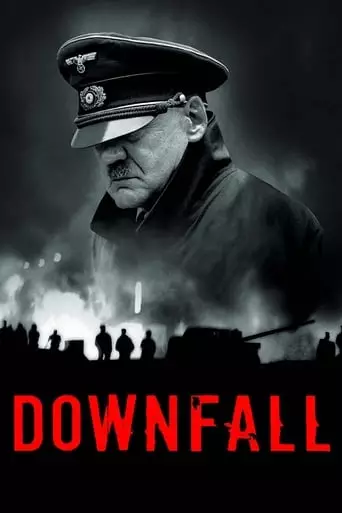
Downfall (2004) Watch Online Free
In April of 1945, Germany stands at the brink of defeat with the Russian Army closing in from the east and the Allied Expeditionary Force attacking from the west. In Berlin, capital of the Third Reich, Adolf Hitler proclaims that Germany will still achieve victory and orders his generals and advisers to fight to the last man. When the end finally does come, and Hitler lies dead by his own hand, what is left of his military must find a way to end the killing that is the Battle of Berlin, and lay down their arms in surrender.
“Downfall” (originally Der Untergang) is a gripping historical drama that takes place during the final days of Adolf Hitler’s rule in 1945, as the Allies close in on Berlin. The film centers around the last moments inside the Führerbunker, Hitler’s underground headquarters, where he and his closest associates face the inevitable defeat of Nazi Germany.
The narrative is driven through the perspective of Traudl Junge, Hitler’s personal secretary, whose disillusionment and horror gradually unfold as she witnesses the collapse of the Nazi regime. As the Red Army advances towards Berlin, Hitler, portrayed by Bruno Ganz, remains defiant, ordering his generals to mount a counterattack, even as the situation becomes increasingly desperate. Tensions mount within Hitler’s inner circle, including figures such as Joseph Goebbels and his wife, Magda, who ultimately take extreme actions as the war ends in disaster.
The film explores not only the personal decisions and despair of these figures but also the emotional and physical devastation of a city in the throes of collapse.
Downfall excels in its vivid portrayal of historical accuracy, both in terms of the setting and the complex personalities involved. Director Oliver Hirschbiegel’s meticulous attention to detail, including the claustrophobic setting of the Führerbunker and the tense atmosphere of Berlin’s last days, invites viewers into the heart of the Nazi regime’s demise.
The film’s success is heavily attributed to the stunning performance of Bruno Ganz as Hitler, whose portrayal reveals a man torn between reality and delusion. His ability to shift between moments of vulnerability and intense rage mirrors the collapse of the Third Reich itself. Ganz’s performance stands out as one of the most memorable in historical cinema, humanizing a figure notorious for inhumanity without excusing his actions.
In addition to the powerful performances, the film’s cinematography and editing create a sense of urgency and collapse, placing the audience right in the middle of one of the darkest chapters in history. The sense of impending doom is palpable throughout, making the film not only historically significant but also emotionally powerful.
After watching Downfall, you are likely to experience a deep sense of unease and reflection. The film does not shy away from depicting the horrific realities of the final days of the Nazi regime, and it forces the audience to confront the complex nature of evil and power. You may feel sorrow for the countless lives lost due to Hitler’s ideology and the blind loyalty of his followers.
You might also experience anger and disbelief as you witness the complete breakdown of morality within the bunker and the self-destructive tendencies of those involved. There is a lingering sense of grief over the innocent lives destroyed by the war and the devastating consequences of blind allegiance to a tyrant.
Ultimately, Downfall serves as both a historical document and a profound meditation on the nature of power, responsibility, and the human condition under extreme circumstances. The film leaves a lasting impact, urging reflection on the darkest moments of human history.
